Mobile
Green NGO drives change at grass roots
2010-Apr-20 07:50:13
How citizen groups are helping to clean up the countryside. Li Jing reports from Henan.
When Tian Guirong first read Silent Spring, Rachel Carson's seminal 1962 book that is credited with helping to launch the environmental movement, it changed her life.
She was so inspired by the American naturalist's courage to speak out about the human impact on ecology (Carson was harshly criticized at the time for her claims pesticides caused pollution), she knew she could make a real difference.
"I could not help but cry when I learned the author was fighting breast cancer when she wrote the book," said the 58-year-old businesswoman from Xinxiang, Henan province. "It forced me to ask myself, 'Why don't I do something to help save the environment'?"
In the years following Silent Spring, she has done just that and even founded China's first "green" non-government organization (NGO) run solely by farmers.
Since its establishment in 2002, Xinxiang Environmental Protection Volunteers has collected more than 70 tons of waste batteries, a serious risk to the ecology in the countryside, and led a pollution survey involving farmers across the whole drainage area of the Yellow River.
Although she finished her just studies after completing only primary education, by the late 1990s Tian was a successful battery dealer in Xinxiang, having worked her way up from a saleswoman at a small township company a decade earlier.
It was not until she took a trip to the nation's capital in 1999 did she become aware of the need for greater environmental protection.
"I read in a magazine I picked up in Beijing that the discharge from a leaking battery can pollute up to 600,000 liters of water and, if buried, can sterilize 1 square meter of farmland," said Tian. "I was shocked. I really didn't know the business I was in could be potentially harmful to the environment. After I came back from Beijing, I immediately started to collect all the used batteries at my stall in the department store."
She discovered that getting others as enthusiastic about environmental protection was not so easy, however.
Although the Friends of Nature - China's first environmental NGO - was founded in 1994, understanding on the green issue was still limited among the majority of the Chinese public, and even less so in Xinxiang, a second-tier city in northern Henan.
Much to the confusion of her family, Tian invested her own savings to begin a battery collecting campaign, as well as printed leaflets and organized public activities to spread the environmental message. In 2001, she also launched greentian.org, a website to gather and disseminate information on green issues.
"I didn't have much education but I tried to improve my knowledge as much as possible. Luckily, the Xinxiang environmental protection bureau offered a lot of help," said the eco-activist. "I began to borrow books from the bureau, including Silent Spring, and I was also the first farmer to ever subscribe to China Environment News, an official publication of the State ministry."
Films also offered more inspiration for Tian, including the Oscar-winning Erin Brockovich, the true-life tale of an unemployed single mother who exposed a series of industrial poisonings in the United States and helped to bring a powerful company to justice.
"Even with Chinese subtitles, I still had to watch the video three times to fully understand it. The story gave me the courage to do something similar," she said.
Targeting polluters
Raised in a village called Fanling, Tian said she has many beautiful memories from her childhood.
"The village is at the foot of Taihang mountain and a tributary of the Yellow River runs through it," she said. "The scenery used to be really good and, some winters, wild geese would stay at a nearby lake."
As more factories moved into the area over the last two decades, the water in the village stream has turned black, while large numbers of villagers now suffer from illnesses caused by pollution, such as cancer, she said.
After meeting with staff from China's leading environmental NGOs in 2001, she decided to set up her own in Henan.
"There were already some environmental NGOs at that time but mostly based in big cities like Beijing and Shanghai. I felt the rural areas also needed such organizations," said Tian.
Twelve months later, Xinxiang Environmental Protection Volunteers was ready for action. Its first target: river pollution in Henan.
Starting out with just a dozen volunteers, the group began its pollution survey in Xinxiang in 2003, creating a comprehensive "pollution map". Two years later, the project was expanded along the Yellow River.
The group now boasts more than 3,000 members, including farmers, students, and workers.
Every year, the self-funded volunteers spent several months on inspections of polluting factories. They took pictures of discharges from plants, collected water near sewage inflow points, tested them and sent the results to local environmental protection bureaus.
"We have helped close more than 100 polluting factories," said Tian proudly. "I have become a common enemy of these enterprises."
The name Tian Guirong is now notorious in Xinxiang and neighboring counties. Whenever a factory is reported for illegal discharging of pollutants, many people in the region automatically believe she was the one who turned them in.
However, such enmity dealt her a huge blow in 2008 when she lost an election to keep her job as head of Fanling village.
Tian had served in the post for three years, winning support in 2005 thanks to her concept of "building a green village". It was a hard-won opportunity to experiment with and exemplify her sustainable management beliefs at the grassroots level. She vetoed polluting projects, cleaned up waterways, built a "green corridor" with tree planting and established a special water supply plan to teach villagers to save water.
She thought she was helping to restore the old, beautiful village of her childhood, but was in the end voted out by villagers who wanted those polluting enterprises.
"I had a good cry when I learned the result. Maybe I need to change some of my methods," she said.
The election defeat has allowed her to concentrate more on Xinxiang Environmental Protection Volunteers, which like most grassroots NGOs faces a constant fund-raising headache.
Over the past decade, Tian has invested 380,000 yuan ($55,000) of her own money into the organization. The only other funding it has received has come from several awards, including conservation and environmental grants from Ford, the automaker. Despite the hardships, she has never once contemplated giving up the fight.
"I hope to attract some enterprise members, which would be a way to sustain our funding, but of course they will have to live up to our environmental standards," she said.
Tian plans to launch a project to protect Taihang mountain this year. She claims some illegal cement plants are quarrying on the mountains and causing extensive damage to the ecology.
Listening to citizen experts
While grassroots NGOs continue to confront polluting plants in the countryside, some educated elites are also attempting to use their expertise to push the environmental protection message in the cities.
Amid repeated protests over the construction of incinerators in metropolises like Beijing, Shanghai and Guangzhou, a team of volunteers in the capital's Aobei residential community has been campaigning for the central government to adopt its policy proposal on garbage treatment since last November.
The 25,000-word proposal, the first of its kind from Chinese citizens, followed months of research, which included analyses of scientific studies, interviews with environmental experts and media professionals, and public consultations. The draft was revised three times before it was sent to the authorities.
Although it is still unknown whether their advice will be accepted, experts say their actions have offered an alternative for the public to take part in the policymaking process.
"Our society has entered an era when the public pursues knowledge about environmental protection consciously," said Feng Yongfeng, one of the founders of Green Beagle, a Beijing-based NGO that aims to advocate popular science among the public. "Like Aobei group, we are likely to see more citizen experts and journalists find out more about the environment we're living in."
The public is no longer satisfied with easy steps, such as turning off lights in empty rooms or not using plastic bags, he said. "They want to know how their life is impacted by potential pollutions."
One "citizen expert" is Cheng Jing, a 39-year-old electronic engineer in Beijing who has become an unofficial authority on electrical and magnetic radiation.
He tested radiation levels at several spots in his community last year as both he and his neighbors feared they were being exposed to dangerous radiation from a nearby cellphone transmission tower and power line. Using a surveymeter bought on taobao.com, a popular online shopping website, the result was assuring: the levels of radiation were far below the safety guidelines.
"The result may not be 100 percent accurate because I'm not using precision equipment but it still can provide reliable references for our purpose," said Cheng.
Last year, Cheng was invited by a dozen residential communities to carry out similar tests. Some citizens even have home appliances like microwave ovens and LCD televisions tested, he said.
|
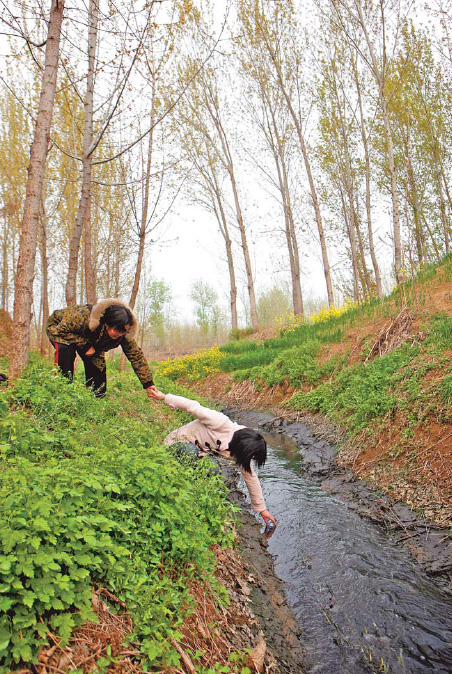
Tian Guirong, left, and a member from the Xinxiang Environmental Protection Volunteers, the NGO she set up in 2002, attempt to get water sample from a drainage outlet of a small pharmacy factory in Loucun, Henan province. Zhang Tao / China Daily photos |
|
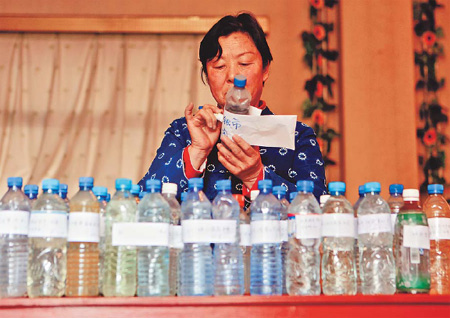
Tian Guirong tags bottles containing samples she and her team collect from different water sources around the rural areas in Henan province. |
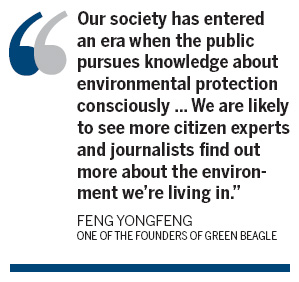
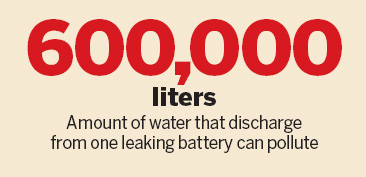
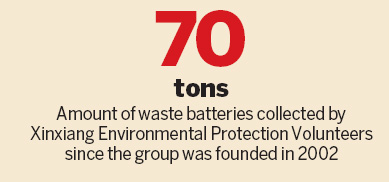
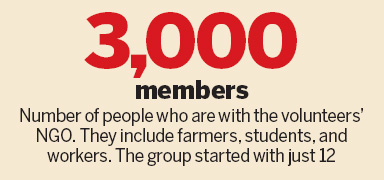
(China Daily 04/20/2010 page1)
[Jump to ]
Nation | Biz | Comment | World | Celebrity | Odds | Sports | Travel | Health
m.chinadaily.com.cn
To subscribe to China Daily, call 010-64918763 or email to circu@chinadaily.com.cn





